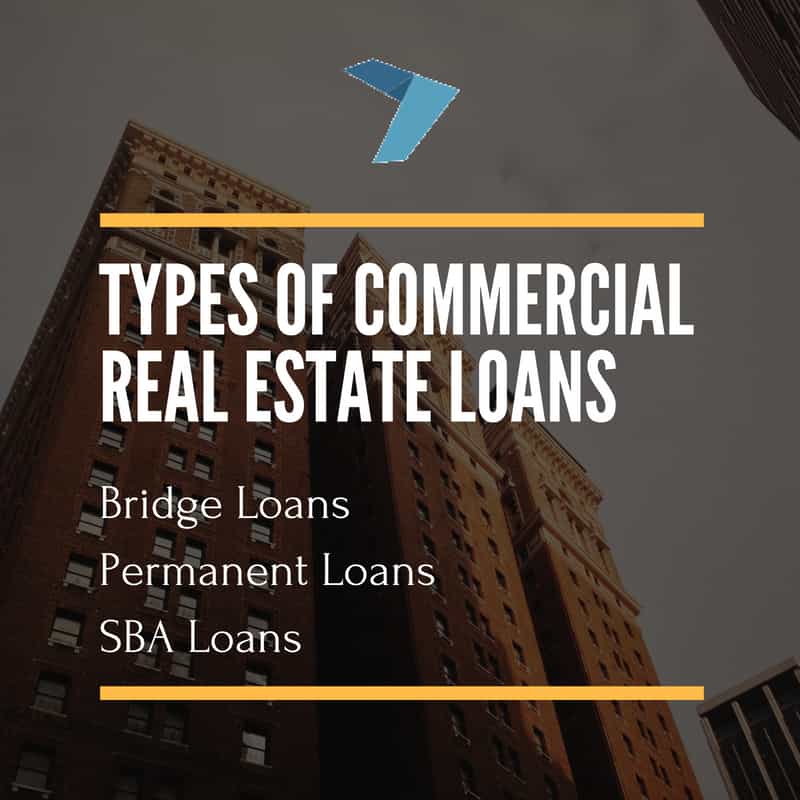
03 Oct Types of Commercial Real Estate Loans

Types of Commercial Real Estate Loans
Commercial real estate loans are a common type of commercial loan
What Is a Commercial Real Estate Loan?
A commercial real estate loan is a mortgage secured on a commercial property, rather than a residential property.
They can be offered by banks, private lenders, insurance companies, pension funds, and even the U.S. Small Business Administration. Commercial real estate loans can create business partnerships, allow businesses to expand, and help owners avoid foreclosure. They are offered by a variety of banks and lenders willing to take on the risks inherent in commercial real estate development.
The incentive for lenders to make loans to commercial real estate owners is that their properties typically attract wealthy tenants and sometimes produce millions of dollars in revenue. Although the risk is high, the money-making incentives can be even higher.
Types of Commercial Real Estate Loans
Understanding different loan options and how they work can help real estate professionals and commercial building owners, as well as lenders, better navigate financing opportunities in times of need.
Bridge Loans
A bridge loan gives the borrower instant cash flow to finance a project’s immediate needs. Bridge loans are temporary, usually with a term of one year or so. They’re normally obtained while the borrower is waiting for long-term financing to come through.
Bridge loans are usually offered by private lenders. They require excellent credit scores and proof of income. Borrowers must also show that they have enough cash to cover the property’s existing expenses plus repayment of the new loan.
Real Estate Purchase Loans
Real estate purchase loans are similar to fixed-rate and adjustable-rate commercial mortgages. Borrowers must have excellent credit to qualify for this type of loan and significant savings in both business and personal bank accounts.
Lenders generally require that the commercial property be used as collateral. The loan’s interest rate is determined by the loan-to-value ratio.
Hard Money Loans
An owner must list the commercial property as collateral to qualify for a hard money loan, even if the loan is being used to save the property. Hard money loans are normally offered by private lenders who don’t have to meet the same standards as mainstream commercial lenders.
These loans are temporary, not long-term, and are only offered when time is of the essence, such as during a foreclosure proceeding. They carry a high risk of default and a correspondingly high-interest rate.
Joint Venture Financing
Private investors and investment firms usually offer joint venture loans. Typically, two partners in a group apply for the financing together. A joint venture loan is helpful when neither party in a partnership can obtain financing alone. It can create an arrangement in which all parties share equally in a property’s profits and losses.
Unlike a true real estate partnership, the relationship between the loan applicants doesn’t have to be official or extend beyond the financed property and the loan.
Participating Mortgage
Under a participating mortgage, the lender is permitted to share in part of the revenue generated by a commercial property. The lender receives its monthly mortgage payment along with interest, as well as a share in the property’s rental income or sales proceeds.
Participating mortgages are popular among office and retail properties when well-known, financially stable tenants have signed long-term leases.
Key Takeaways
Bridge Loan: A short-term loan that gives a borrow instant cash flow for updating or maintaining commercial real estate
Real Estate Purchase Loan: A form of mortgage for buying commercial property in which the property is used as collateral
Hard Money Loan: Temporary loans with high interest rates used to save a property, such as one facing foreclosure
Joint Venture Financing: Loan given to a partnership in which both partners share in the risks, rewards, and profits from the commercial property
Participating Mortgage: Arrangement in which the lender receives a share of the profits from the commercial property, as well as interest on the loan
Choosing the Right Commercial Real Estate Loan
Types of Commercial Real Estate Loans, Joint Venture Financing, Hard Money Loans, Real Estate Loans, Real Estate Loan Lenders, Bridge Loans, Commercial Real Estate Loan, business loan lender, business loan lenders, business loan companiesThe right type of loan will depend on your financial history, the type of real estate you own, your goals for that property, and what you intend to use the loan to accomplish.
There are many other types of lenders, including:
- Peer-to-peer (P2P) lenders
- Crowdfunding contributors
- Family and friends
- Yourself
P2P lenders can operate through online organizations, like LendingClub. These sites connect lenders with borrowers. P2P interest rates may be lower than borrowers would find with a traditional bank, but higher than a lender could receive from a certificate of deposit.
Crowdfunding sites like Kickstarter are similar to P2P lending sites, in that they digitally connect the people who need money with the people who have money. Unlike P2P lending, the people who contribute to crowdfunding efforts may not receive their money back dollar-for-dollar. Instead, they may receive perks from the person or project being funded. For example, someone may donate to a movie project’s Kickstarter, and in return, they’ll receive a copy of the movie once it’s completed.
Family and friends can become lenders, and these transactions are sometimes called “private party loans.” It’s important to consider the impact a loan might have on your personal relationship with these people. A loan agreement may help ensure everyone is on the same page.
However, the most common lenders are banks, credit unions, and other financial institutions such as Grand City Investment Limited that is a Licensed Money Lender that was incorporated in Hong Kong on MAY 29, 1984 with Company Registration No. 0137353 under the Money Lenders Ordinance (Chapter 163 of the laws of Hong Kong) to provide all types of loans, secured and unsecured loans, Recourse and Non Recourse Loans, Trade Finance, Insurance, Investments, Wealth Management, Portfolio Management, Trade Platforms, Private Placement Programs as well as the issuance and monetization of Bank Instruments such as Standby Letter of Credit (SBLC), Bank Guarantees (BG), Usance LC, Letters of Credit, Differed Letters of Credit and Funding for companies, SME’s and private individuals.
You can send us an email to learn more about our loan terms and conditions: apply@grandcityinvestment.com





No Comments